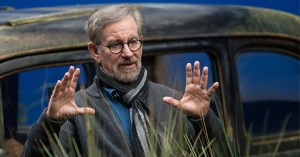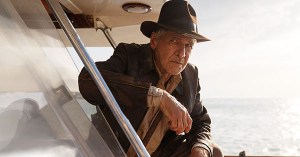12 New Year’s Resolutions on Film
Happy New Year! In this week's Total Recall, we take a look at some films that correspond with the most popular resolutions.
The holidays are behind us, 2015 is a memory, and a brand new year lies ahead — and for a lot of us, that means drawing up a list of resolutions that we all know we’ll probably end up breaking before St. Patrick’s Day. In the spirit of the New Year, we’ve decided to round up a list of movies that correspond with some of the most popular resolutions. Whether you’re trying to quit smoking, change your diet, or get your finances in order — of even if you feel like your life is in pretty good shape as it is — here’s a cinematic smorgasbord to help you ring in 2016. Should auld acquaintance be forgot, it’s Total Recall!
Drink Less Alcohol:

For most of us, unwittingly gulping down a roofie is the biggest danger we face when accepting drinks from a stranger in a strange place. But for recovering alcoholic Jack Torrance (Jack Nicholson), his decision to fall off the wagon in The Shining means striking up a deadly bargain with the malevolent spirits that really run the spooky old hotel he’s been tasked with looking after over a bitter Colorado winter. Next thing you know, ol’ Jack’s chasing after Shelley Duvall with an axe and wandering through the world’s freakiest topiary — food for thought the next time you think about ordering that extra drink. And as for The Shining? It is, as Emma Dibdin wrote for Digital Spy, “One of the most viscerally disturbing films ever made.”
Eat Healthier:

A blistering non-fiction takedown of empty calories and corporate agriculture might not be the first place most people would look when hunting for books to adapt for the big screen, but Richard Linklater isn’t like most directors. Sadly, many critics felt Linklater’s ensemble-driven take on Eric Schlosser’s Fast Food Nation failed to turn the book’s passionate argument against mass-produced meals into a compelling movie — although for an equal number of scribes, the powerful performances delivered by the impressive cast (which included Bruce Willis, Luis Guzman, and Patricia Arquette) made up for any narrative gaps. “For slicing through the euphemisms and getting to the heart of the matter,” argued Joe Williams of the St. Louis Post-Dispatch, “Fast Food Nation is the most important American film of the year.”
Get a Better Education:

Rodney Dangerfield’s schlubby humor and salt-of-the-earth persona made him the perfect fit for Back to School, starring the respect-deficient comedian as a self-made millionaire who, needing a distraction from his latest philandering trophy wife, decides to head back to college as a way of bettering himself while reconnecting with his uptight son (Keith Gordon). While it presents roughly the same cartoonishly unrealistic picture of campus life as any other 1980s college comedy, School has a sweet core lacking from most of the decade’s T&A-fueled romps, and it benefits greatly from charismatic performances by Dangerfield and a young Robert Downey, Jr. “It’s a good character for Dangerfield,” nodded the Chicago Reader’s Dave Kehr, “one that veers him away from the ‘I don’t get no respect’ pathos that comes too easily to him, and enough attention is paid to the minimal plot to integrate Dangerfield’s classically constructed one-liners.”
Get a Better Job:

No matter how many degrees you have, moving up the corporate ladder often comes down to who you know. Even then, as naive college grad Brantley Foster (Michael J. Fox) discovers early in The Secret of My Success, your family connections might not be good for much more than a gig in the mailroom — unless you opt for the non-traditional approach and invent a new employee who rocks the boardroom in spite of the fact that he doesn’t technically exist. A major box-office hit in 1987, Success received lukewarm praise from critics, although its frantic screwball pace and slapstick comedy took full advantage of Fox’s comedic gifts, and its corporate setting helped make it what James Sanford of the Kalamazoo Gazette referred to as a “Quintessential 1980s comedy.”
Get Fit:

Atkins, Paleo, South Beach… there’s a diet for every week of the year, but for sheer effectiveness, none of them can hope to match the pound-shedding power of a gypsy curse. At least, that’s what we learn in Thinner, director Tom Holland’s rather misguided adaptation of the gripping Stephen King story about a slovenly lawyer (Robert John Burke) who picks the wrong old lady to run over and ends up losing weight at an alarming rate. While none of the story’s essential themes translated particularly well to the screen, Thinner still managed to raise a few critics’ neck hairs, including Clint Morris of Moviehole, who decreed it “Stephen King’s freakiest film in eons.”
Get out of Debt:

“But wait,” you might be saying. “What does Season of the Witch have to do with getting out of debt?” And while it’s true that in narrative terms, this 2011 fantasy action-adventure about a Crusader traveling to a remote monastery with a woman accused of witchcraft might not offer much in the way of lessons about managing one’s money, behind the scenes, it was all about getting back into the financial black. At least it was for star Nicolas Cage, who signed on for the project after learning he’d incurred a crushing $13 million tax liability with the IRS. Roundly panned by critics far and wide, Witch is just one of many debt-motivated movies Cage has starred in over the last few years — not that his motivations mattered to writers like ReelViews’ James Berardinelli, who opined, “Cage is effective as a falling down drunk in Las Vegas or a treasure hunter navigating goofy road trips but not as a disillusioned champion of the Church going one-on-one with a demon. Steven Seagal would have been more believable.”
Manage Stress:

With the possible exception of Lewis Black on a good night, it’s hard to like anybody when they’re angry. Bruce Banner, however, takes this maxim to ridiculous green extremes — and while neither of his solo big-screen outings have come close to maximizing the potential of his counterpart on the printed page, Banner’s rampaging alter ego came tantalizingly close to cinematic glory in 2008’s The Incredible Hulk, starring Edward Norton as the hunted scientist who morphs into an indestructible beast whenever he gets a little too ticked off. Packed with action and ripe with subtext, the 2008 Hulk tried to split the difference between portraying a man desperately trying to manage his anger and allowing audiences the simple joy of watching him give in to it all and break stuff. It doesn’t always work, but for David Cornelius of eFilmCritic.com, it all added up to “One of the great monster movies, exciting and scary and sad all at once.”
Quit Smoking:

This classic 1947 noir isn’t really about quitting smoking — in fact, ex-P.I. Jeff Bailey (Robert Mitchum) has a cigarette in hand just about every time he’s on the screen — but it makes puffing tobacco look like such a stone cold cool habit that a viewer can pretty much inhale the vice’s visceral pleasures just by watching Out of the Past. In fact, no less an authority than Roger Ebert deemed it one of the all-time greatest smoking movies; as he put it, “There is a lot of smoking in all noirs, even the modern ones, because it goes with the territory. Good health, for noir characters, starts with not getting killed. But few movies use smoking as well as this one; in their scenes together, it would be fair to say that Mitchum and [Kirk] Douglas smoke at each other, in a sublimated form of fencing.”
Reduce, Reuse, and Recycle:

It’s hard to imagine any studio other than Pixar having success with a family film this idiosyncratic — a movie about a lonely trash-compacting robot with a mostly dialogue-free first act doesn’t exactly scream “summer blockbuster” — but audiences trusted the Pixar brand enough to show up in droves for WALL-E, and they were rewarded with not only one of the best-reviewed animated releases of 2008, but what was, in the words of the Boston Globe’s Jay Carr, “the best American film of the year to date.” The movie’s eco-friendly storyline came with a surprising bit of controversy, drawing fire from conservative pundits who were annoyed with what they interpreted as a left-wing, anti-business message, but its 96 percent Tomatometer and massive $534 million gross drowned out the chatter. As with just about everything Pixar has done, it works whether you’re looking to be edified or simply entertained; as the New York Times’ A.O. Scott noted, “it is, undoubtedly, an earnest (though far from simplistic) ecological parable, but it is also a disarmingly sweet and simple love story, Chaplinesque in its emotional purity.”
Spend More Time with Family:

Nothing’s more important than family, but sometimes it’s hard for us to see that until it’s almost too late. For example, take Max Dugan (Jason Robards), whose decades of estrangement with his daughter (Marsha Mason) come to a sudden end when he shows up on her doorstep to right old wrongs and start a relationship with his grandson (Matthew Broderick) — and share the bitter news of his impending death. Boasting a screenplay by Neil Simon and typically light-fingered direction from Herbert Ross, Max Dugan Returns entranced critics like Janet Maslin, who wrote for the New York Times, “There are certainly some questionable ingredients to the story, but you’re not likely to notice them while the film is under way. You’re likely to be laughing.”
Take a Trip:

Vacations are always fun in theory, but it’s very rare that every member of the family is equally on board with whatever the person planning the trip has in store — especially if said planner is an arrogant-yet-well-meaning dunderhead like Clark Griswold (Chevy Chase), who miscalculates basically every possible preparation for the family trip to Wally World in National Lampoon’s Vacation. From getting saddled with a lemon of a car to refusing to ask for directions, Clark makes plenty of mistakes — and when he isn’t messing things up on his own, he’s beset with annoying family members (like Randy Quaid’s legendary Cousin Eddie) who do it for him. The final act descends into lunacy, but underneath it all is a frantic desperation for an unattainable ideal that lies at the dark, splintered heart of any vacation gone wrong. “The Griswolds,” decreed Fred Topel for Crave, “are a national treasure.”
Volunteer to Help Others:

Lawrence Bourne III (Tom Hanks) doesn’t exactly start donating his time for the most altruistic reasons — he’s trying to dodge a gambling debt by fleeing the country — but once he ends up on a plane full of Peace Corps volunteers bound for Thailand, he’s in for the experience of his life, in terms of manual labor as well as the many misadventures he gets into alongside fellow volunteer Tom Tuttle (John Candy). And while Volunteers may not have drummed up the sort of box office totals the studio was hoping for from reunited Splash vets Candy and Hanks, it tickled Walter Goodman of the New York Times, who wrote, “Take a healthy helping of Raiders of the Lost Ark, a dollop of The Bridge on the River Kwai, a dash of any Tarzan movie, a soupcon of Casablanca, a whiff of The Wizard of Oz and a stunt or two from a favorite Saturday serial, stir frenetically, and if you’re lucky enough to have snappy dialogue by Ken Levine and David Isaacs, you may end up with as funny a movie as Volunteers.”










